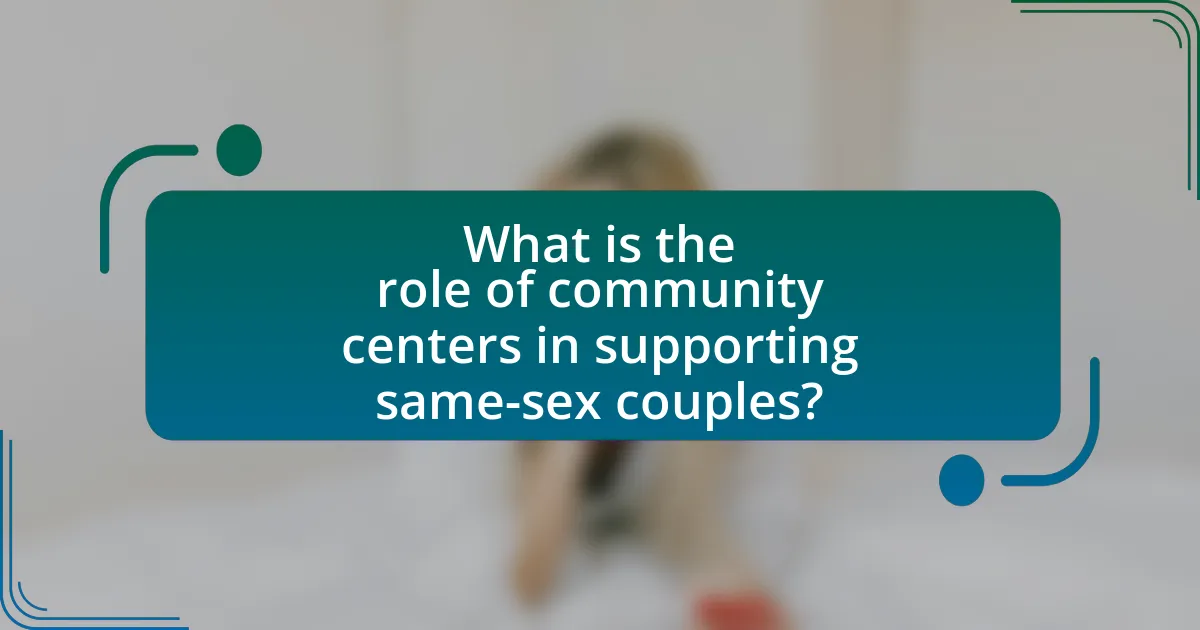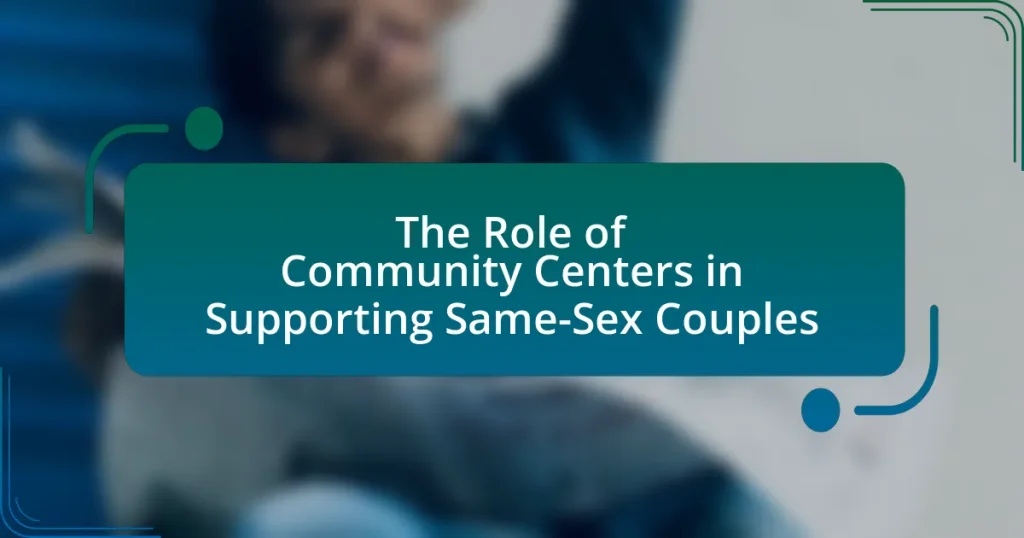Community centers play a vital role in supporting same-sex couples by providing safe spaces, resources, and advocacy tailored to the unique challenges faced by LGBTQ+ individuals. These centers offer a variety of services, including counseling, legal assistance, and educational workshops, which enhance mental well-being and foster social connections. Historical context highlights the importance of these centers in addressing discrimination and promoting inclusivity, while research indicates that engagement with community centers significantly improves the quality of life for same-sex couples. Additionally, the article discusses the challenges community centers face, such as funding limitations and societal stigma, and outlines best practices for enhancing support and outreach to the LGBTQ+ community.

What is the role of community centers in supporting same-sex couples?
Community centers play a crucial role in supporting same-sex couples by providing safe spaces for social interaction, resources, and advocacy. These centers often offer programs that promote inclusivity, mental health services, and legal assistance tailored to the unique challenges faced by LGBTQ+ individuals. For instance, a study by the Williams Institute found that community centers significantly enhance the well-being of LGBTQ+ individuals by fostering a sense of belonging and reducing isolation. Additionally, community centers frequently host events and workshops that educate the public about LGBTQ+ issues, thereby promoting acceptance and understanding within the broader community.
How do community centers provide resources for same-sex couples?
Community centers provide resources for same-sex couples by offering a range of support services, including counseling, legal assistance, and social activities tailored to LGBTQ+ needs. These centers often host workshops on relationship building, provide access to healthcare resources, and facilitate support groups that foster community connections. For instance, the Human Rights Campaign reports that community centers play a crucial role in creating safe spaces where same-sex couples can engage with others facing similar challenges, thus enhancing their social support networks.
What types of resources are typically available at community centers?
Community centers typically offer a variety of resources, including recreational facilities, educational programs, health services, and social support groups. These centers often provide spaces for physical activities such as gyms and sports fields, as well as classes for skill development in areas like arts, cooking, and technology. Additionally, many community centers facilitate access to health resources, including mental health counseling and wellness workshops. They also serve as hubs for social support, hosting groups that focus on specific communities, including those for same-sex couples, fostering inclusivity and connection.
How do these resources address the specific needs of same-sex couples?
Community centers address the specific needs of same-sex couples by providing tailored support services, resources, and safe spaces for social interaction. These centers often offer counseling, legal assistance, and educational workshops focused on issues pertinent to LGBTQ+ relationships, such as navigating legal rights and healthcare access. For instance, a study by the Williams Institute found that community centers significantly improve mental health outcomes for LGBTQ+ individuals by fostering a sense of belonging and reducing isolation. Additionally, many centers host events that promote visibility and acceptance, directly addressing the unique challenges faced by same-sex couples in society.
Why are community centers important for the LGBTQ+ community?
Community centers are crucial for the LGBTQ+ community as they provide safe spaces for social interaction, support services, and advocacy. These centers foster a sense of belonging and community, which is essential for individuals who may face discrimination or isolation. Research indicates that LGBTQ+ individuals who engage with community centers report higher levels of mental well-being and lower rates of depression. For instance, a study published in the American Journal of Public Health found that access to LGBTQ+ community centers significantly reduces feelings of loneliness and improves overall life satisfaction among participants.
What historical context supports the establishment of community centers for LGBTQ+ individuals?
The historical context supporting the establishment of community centers for LGBTQ+ individuals includes the social and political movements that emerged during the mid-20th century, particularly the Stonewall Riots of 1969, which marked a pivotal moment in the fight for LGBTQ+ rights. Following these events, there was a growing recognition of the need for safe spaces where LGBTQ+ individuals could gather, access resources, and receive support. This led to the formation of community centers that provided essential services, advocacy, and a sense of belonging, addressing the marginalization and discrimination faced by LGBTQ+ populations. The establishment of these centers was further reinforced by the AIDS crisis in the 1980s, which highlighted the necessity for community support networks and health services tailored to the needs of LGBTQ+ individuals.
How do community centers foster inclusivity and acceptance?
Community centers foster inclusivity and acceptance by providing safe spaces for diverse groups to gather, share experiences, and access resources. These centers often host programs and events specifically designed to promote understanding and respect among different communities, including LGBTQ+ individuals. For instance, many community centers offer workshops, support groups, and social events that encourage dialogue and connection, which helps to break down barriers and combat discrimination. Research indicates that community centers that actively engage in outreach and education can significantly improve social cohesion and acceptance within their neighborhoods, thereby enhancing the overall well-being of marginalized groups.
What services do community centers offer to same-sex couples?
Community centers offer various services to same-sex couples, including counseling, support groups, educational workshops, and social events. These services aim to foster a sense of community, provide emotional support, and enhance relationship skills. For instance, many community centers host LGBTQ+ specific counseling sessions that address unique challenges faced by same-sex couples, promoting mental well-being and relationship health. Additionally, support groups create safe spaces for couples to share experiences and connect with others, while educational workshops often cover topics such as legal rights, health resources, and relationship dynamics. Social events organized by community centers also encourage networking and community building among same-sex couples, reinforcing their social support systems.
How do counseling and support groups function within community centers?
Counseling and support groups within community centers provide essential emotional and psychological assistance to individuals, particularly same-sex couples, by fostering a safe and inclusive environment for sharing experiences and challenges. These groups facilitate open discussions, enabling participants to connect with others facing similar issues, which can reduce feelings of isolation and promote mental well-being. Research indicates that community-based support systems significantly enhance coping strategies and resilience among marginalized populations, including LGBTQ+ individuals, by offering resources and a sense of belonging.
What educational programs are available for same-sex couples at community centers?
Community centers offer various educational programs specifically designed for same-sex couples, including relationship workshops, financial planning seminars, and parenting classes. These programs aim to enhance communication skills, provide financial literacy, and support family dynamics within the LGBTQ+ community. For instance, workshops may cover topics such as conflict resolution and effective communication, while financial seminars often address budgeting and investment strategies tailored for couples. Additionally, parenting classes can focus on navigating legal issues and fostering inclusive environments for children. These initiatives are essential in promoting healthy relationships and providing resources tailored to the unique challenges faced by same-sex couples.
How do community centers promote social connections among same-sex couples?
Community centers promote social connections among same-sex couples by providing inclusive spaces for social interaction and community engagement. These centers often host events, workshops, and support groups specifically designed for LGBTQ+ individuals, fostering a sense of belonging and acceptance. Research indicates that participation in community activities can enhance social networks and reduce feelings of isolation among same-sex couples, as evidenced by studies showing that LGBTQ+ individuals who engage in community programs report higher levels of social support and well-being.
What types of events are organized to encourage networking and community building?
Community centers organize various events to encourage networking and community building, including workshops, social gatherings, support groups, and educational seminars. Workshops often focus on skill development and personal growth, fostering connections among participants. Social gatherings, such as potlucks or mixers, create informal environments for individuals to meet and share experiences. Support groups provide safe spaces for individuals to discuss challenges and build relationships based on shared experiences. Educational seminars offer valuable information on relevant topics, promoting engagement and interaction among attendees. These events collectively enhance community ties and support networks, particularly for same-sex couples seeking connection and resources.
How do these events help combat isolation within the LGBTQ+ community?
Events organized by community centers play a crucial role in combating isolation within the LGBTQ+ community by fostering social connections and providing safe spaces for individuals to engage with one another. These gatherings create opportunities for networking, support, and shared experiences, which are essential for building a sense of belonging. Research indicates that participation in community events can significantly reduce feelings of loneliness and improve mental health outcomes among LGBTQ+ individuals, as highlighted in a study published in the Journal of Homosexuality, which found that social support networks are vital for emotional well-being.
What challenges do community centers face in supporting same-sex couples?
Community centers face several challenges in supporting same-sex couples, primarily stemming from societal stigma and limited resources. Societal stigma can lead to discrimination and a lack of acceptance, which may deter same-sex couples from seeking services. Additionally, many community centers operate with constrained budgets, limiting their ability to provide specialized programs or training for staff on LGBTQ+ issues. According to a 2020 report by the Human Rights Campaign, 46% of LGBTQ+ individuals reported experiencing discrimination in public spaces, highlighting the pervasive challenges that community centers must navigate to create inclusive environments.
How do funding and resource limitations impact community center services?
Funding and resource limitations significantly reduce the capacity of community centers to provide essential services. These constraints often lead to decreased program offerings, limited operational hours, and reduced staffing, which directly impacts the availability of support for same-sex couples. For instance, a study by the National Council of Nonprofits indicates that 70% of community centers reported cuts in funding, resulting in the elimination of critical programs aimed at supporting LGBTQ+ individuals. Consequently, the lack of financial resources hinders community centers from effectively addressing the unique needs of same-sex couples, such as counseling, advocacy, and social support services.
What barriers exist in reaching out to same-sex couples effectively?
Barriers in reaching out to same-sex couples effectively include societal stigma, lack of targeted resources, and insufficient training among service providers. Societal stigma often leads to discrimination and fear of judgment, which can deter same-sex couples from seeking support. Additionally, community centers may lack resources specifically designed for LGBTQ+ individuals, limiting their ability to address unique needs. Furthermore, many service providers may not receive adequate training on LGBTQ+ issues, resulting in misunderstandings or insensitivity that can alienate same-sex couples. These factors collectively hinder effective outreach and support for this demographic.
How can community centers improve their support for same-sex couples?
Community centers can improve their support for same-sex couples by implementing inclusive programs and services tailored to their specific needs. For instance, offering workshops on relationship building, conflict resolution, and legal rights can empower same-sex couples with essential knowledge and skills. Additionally, community centers can create safe spaces for social gatherings and support groups, fostering a sense of belonging and community among same-sex couples. Research indicates that inclusive environments significantly enhance mental health and well-being, as highlighted in the 2020 study by the Williams Institute, which found that supportive community resources reduce feelings of isolation among LGBTQ+ individuals.
What best practices can community centers adopt to enhance their services?
Community centers can enhance their services by implementing inclusive programming that specifically addresses the needs of same-sex couples. This can include workshops on relationship building, legal rights, and health resources tailored to LGBTQ+ individuals. Research indicates that inclusive environments improve participation rates; for instance, a study by the Williams Institute found that LGBTQ+ individuals are more likely to engage with organizations that actively promote inclusivity. Additionally, community centers should establish partnerships with local LGBTQ+ organizations to provide resources and support, ensuring that services are relevant and accessible. By adopting these best practices, community centers can create a welcoming atmosphere that fosters community engagement and support for same-sex couples.
How can community centers engage more effectively with the LGBTQ+ community?
Community centers can engage more effectively with the LGBTQ+ community by creating inclusive programs and services tailored to their specific needs. This includes offering safe spaces for social gatherings, support groups, and educational workshops that address LGBTQ+ issues, which fosters a sense of belonging and community. Research indicates that inclusive environments significantly improve mental health outcomes for LGBTQ+ individuals, as highlighted in the 2020 report by the Human Rights Campaign, which found that 70% of LGBTQ+ youth feel more accepted in supportive community spaces. Additionally, actively involving LGBTQ+ individuals in the planning and execution of programs ensures that their voices are heard and their needs are met, further enhancing engagement and participation.
What are some success stories of community centers supporting same-sex couples?
Community centers have successfully supported same-sex couples through various initiatives, such as providing safe spaces for social gatherings and offering resources for relationship counseling. For example, the Los Angeles LGBT Center has created programs that focus on mental health support and community engagement, resulting in improved well-being among participants. Additionally, the Center for LGBTQ+ Health Equity in Philadelphia has implemented workshops that educate same-sex couples on legal rights and health resources, leading to increased awareness and access to necessary services. These initiatives demonstrate the positive impact community centers have on fostering inclusive environments and enhancing the quality of life for same-sex couples.
How have specific community centers made a positive impact on same-sex couples’ lives?
Specific community centers have positively impacted same-sex couples’ lives by providing essential resources, support networks, and safe spaces for social interaction. For instance, the LGBTQ Community Center in New York City offers counseling services, legal assistance, and health resources tailored to the needs of same-sex couples, fostering a sense of belonging and community. Additionally, research from the Williams Institute indicates that access to supportive community centers correlates with improved mental health outcomes for LGBTQ individuals, highlighting the importance of these centers in enhancing the overall well-being of same-sex couples.
What lessons can be learned from these success stories to apply to other centers?
Success stories from community centers supporting same-sex couples highlight the importance of inclusivity, tailored programming, and community engagement. These centers demonstrate that creating a welcoming environment fosters trust and encourages participation among same-sex couples. For instance, centers that offer specific resources, such as legal advice and mental health support, have seen increased utilization of services, indicating that targeted assistance meets the unique needs of this demographic. Additionally, successful outreach strategies, such as partnerships with local LGBTQ+ organizations, enhance visibility and accessibility, proving that collaboration amplifies impact. These lessons emphasize that other centers can replicate these strategies to effectively support same-sex couples in their communities.
What practical steps can same-sex couples take to utilize community center resources?
Same-sex couples can utilize community center resources by first identifying local community centers that offer programs and services tailored to LGBTQ+ individuals. They should then participate in events, workshops, and support groups specifically designed for same-sex couples, which can foster connection and provide valuable information. Additionally, couples can engage with community center staff to learn about available resources such as counseling services, legal assistance, and social activities that promote inclusivity. Research indicates that community centers play a crucial role in enhancing the well-being of LGBTQ+ individuals by providing safe spaces and supportive networks, which reinforces the importance of these steps for same-sex couples.


